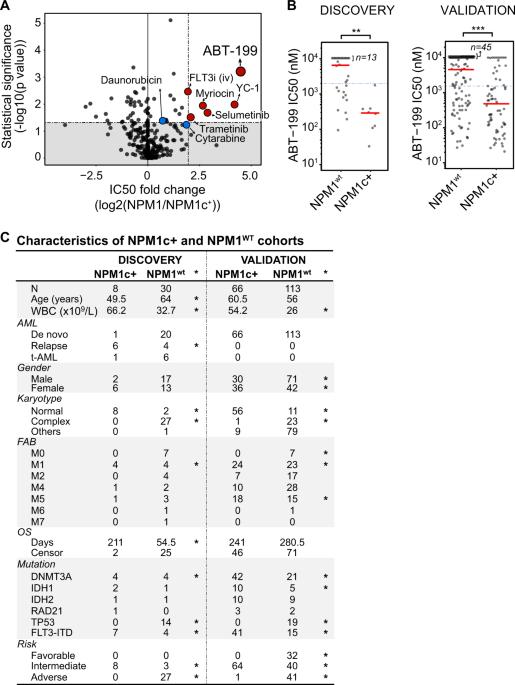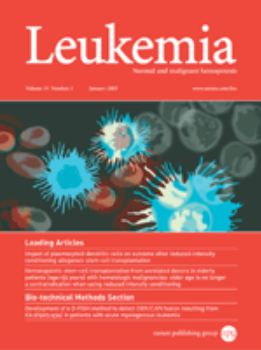Genetic characterization of ABT-199 sensitivity in human AML
IF 13.4
1区 医学
Q1 HEMATOLOGY
引用次数: 52
Abstract
Acute myeloid leukemias (AML) with mutations in the NPM1 gene (NPM1c+) represent a large AML subgroup with varying response to conventional treatment, highlighting the need to develop targeted therapeutic strategies for this disease. We screened a library of clinical drugs on a cohort of primary human AML specimens and identified the BCL2 inhibitor ABT-199 as a selective agent against NPM1c+ AML. Mutational analysis of ABT-199-sensitive and -resistant specimens identified mutations in NPM1, RAD21, and IDH1/IDH2 as predictors of ABT-199 sensitivity. Comparative transcriptome analysis further uncovered BCL2A1 as a potential mediator of ABT-199 resistance in AML. In line with our observation that RAD21 mutation confers sensitivity to ABT-199, we provide functional evidence that reducing RAD21 levels can sensitize AML cells to BCL2 inhibition. Moreover, we demonstrate that ABT-199 is able to produce selective anti-AML activity in vivo toward AML with mutations associated with compound sensitivity in PDX models. Overall, this study delineates the contribution of several genetic events to the response to ABT-199 and provides a rationale for the development of targeted therapies for NPM1c+ AML.

人类急性髓细胞白血病 ABT-199 敏感性的遗传特征
NPM1基因突变(NPM1c+)的急性髓性白血病(AML)是一个庞大的AML亚群,对常规治疗的反应各不相同,这凸显了为这种疾病开发靶向治疗策略的必要性。我们在一组原发性人类急性髓细胞性白血病标本上筛选了一个临床药物库,发现BCL2抑制剂ABT-199是一种针对NPM1c+急性髓细胞性白血病的选择性药物。对ABT-199敏感和耐药标本的突变分析发现,NPM1、RAD21和IDH1/IDH2的突变是ABT-199敏感性的预测因子。比较转录组分析进一步发现,BCL2A1是AML中ABT-199耐药的潜在介质。根据我们的观察,RAD21突变可使细胞对ABT-199敏感,因此我们提供了功能性证据,证明降低RAD21水平可使AML细胞对BCL2抑制敏感。此外,我们还证明,ABT-199 能够在 PDX 模型中对具有与化合物敏感性相关突变的急性髓细胞白血病产生选择性抗急性髓细胞白血病活性。总之,这项研究阐明了多个基因事件对 ABT-199 反应的影响,并为开发 NPM1c+ AML 靶向疗法提供了理论依据。
本文章由计算机程序翻译,如有差异,请以英文原文为准。
求助全文
约1分钟内获得全文
求助全文
来源期刊

Leukemia
医学-血液学
CiteScore
18.10
自引率
3.50%
发文量
270
审稿时长
3-6 weeks
期刊介绍:
Title: Leukemia
Journal Overview:
Publishes high-quality, peer-reviewed research
Covers all aspects of research and treatment of leukemia and allied diseases
Includes studies of normal hemopoiesis due to comparative relevance
Topics of Interest:
Oncogenes
Growth factors
Stem cells
Leukemia genomics
Cell cycle
Signal transduction
Molecular targets for therapy
And more
Content Types:
Original research articles
Reviews
Letters
Correspondence
Comments elaborating on significant advances and covering topical issues
 求助内容:
求助内容: 应助结果提醒方式:
应助结果提醒方式:


